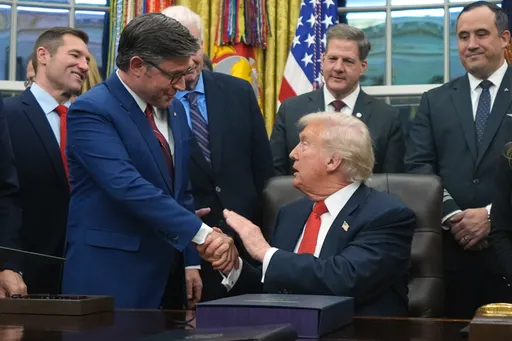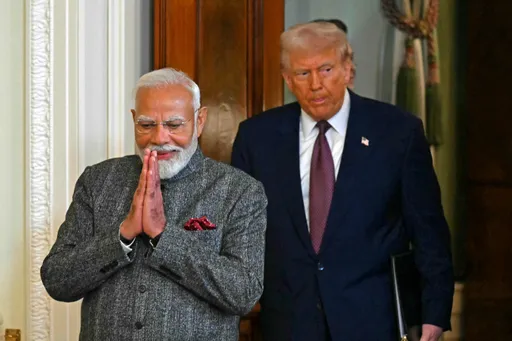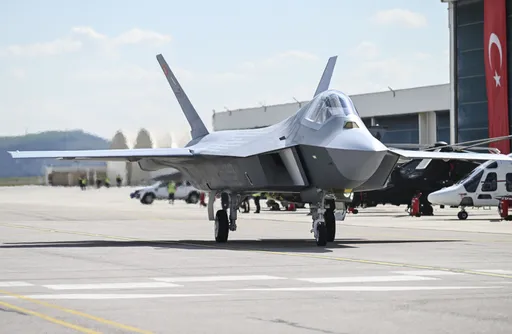On August 5, India unilaterally abrogated the limited autonomy of India-administered Kashmir, the key to Kashmir's 1947 [temporary] accession treaty with India. New Delhi divided the disputed Himalayan region into two zones — both now directly ruled by India.
That decision was accompanied by a harsh crackdown, with India sending tens of thousands of troops in addition to the 500,000 troops already present there, imposing a sweeping curfew, arresting thousands and cutting virtually all communications.
Most Kashmiris say that in doing away with Article 370, India hopes to change India-administered Kashmir's Muslim-majority demographics by allowing in a flood of new Hindu settlers.
Here's a timeline on what has transpired since August.
August 2 – Indian authorities ask tourists to leave disputed Kashmir citing "terror threats," while reportedly dispatching some 25,000 military reinforcements to the troubled Himalayan region.
August 3 – Pakistan says India fired illegal cluster bombs — which emit deadly exploding shrapnel and are prohibited under the Geneva Convention — killing two civilians and wounding 11 others in its portion of disputed Kashmir, a claim India denies.
August 5 – Tensions rise in Muslim-majority Kashmir, claimed by India and Pakistan, as New Delhi unilaterally strips its portion of the region of limited autonomy and statehood. A lockdown follows, tens of thousands of additional troops are deployed, some 500 leaders are arrested, and Kashmiris are cut off from the rest of the world.
August 6 – The EU, OIC, and Turkey urge India and Pakistan to reduce tensions. China says India's move harms its sovereignty. India's Parliament approves Kashmir autonomy abrogation.
August 7 – The US says it backs direct talks between Pakistan and India on Kashmir dispute. Pakistan says it will expel Indian envoy and downgrade ties. A protester dies, over 100 arrested in Kashmir.
August 8 – Pakistan says it will ban Indian movies in theatres.
August 9 – UN chief calls for restraint in Kashmir, asks Pakistan and India to settle the dispute peacefully.
August 9 – India's BJP leader Manohar Lal Khattar sparks controversy after saying Indians from outside Kashmir territory can now marry women from there. Indian police scuttle protests in Kashmir. Pakistan stops train service to India.
August 10 – Iran's military urges Pakistan and India to avoid "hasty decisions" in Kashmir. Pakistan snaps road links with India.
August 13 – Indian apex court backs "security" crackdown and communications blackout in Kashmir. Some 69 Indian activists write a letter to Indian PM Modi calling for an end to Kashmir lockdown. Protests in Kashmir on the first day of Eid al Adha amid tighter curbs.
August 15 – Fact-finding report by Indian activists say the situation in Kashmir "absolutely not normal" despite Indian claims of normalcy in the region.
August 15 – India detains local Kashmiri journalist Irfan Ahmad Malik.
August 15 – Massive rally in London against India. Three Pakistani and five Indian soldiers reportedly killed on Kashmir de facto border. Pro-independence Kashmiris and Pakistanis observe India's Independence Day as "Black Day."
August 16 – UN Security Council holds closed-door session to discuss Kashmir tensions, at the request of China and Pakistan.
August 16 – US President Trump urges Pakistan and India to reduce tensions in Kashmir.
August 19 – US President Trump discusses Kashmir dispute with India, Pakistan premiers.
August 20 – Pakistan says it has decided to take Kashmir dispute to the International Court of Justice at The Hague.
August 21 – Resistance leaders in India-administered Kashmir urge people to defy a ban and join a mass march after Friday prayers in the first such call since the federal government revoked the Muslim-majority region's autonomy.
August 21 – US President Donald Trump offers to mediate Kashmir where "explosive" situation persists.
August 22 – Pakistan seeks UN action against Indian actress Priyanka Chopra, a UN goodwill ambassador, for "supporting war."
August 22 – Pakistan PM Imran Khan rules out talks with India
August 23 – Authorities in the main city of India-administered Kashmir block protest march to a UN office.
August 24 – Popular Kashmiri resistance leader Syed Ali Shah Geelani announces five-point "plan of action" against India's move in Kashmir.
August 24 – Indian PM Narendra Modi given "Order of Zayed" award by UAE amid Kashmir crisis
August 24 – India bars opposition leader Rahul Gandhi and his delegation from entering Kashmir.
August 25 – Top Indian bureaucrat Kannan Gopinathan resigns to protest India's handling of Kashmir.
August 27 – Thousands of students march against India in Pakistan-administered Kashmir.
August 28 – AFP news agency says 500 protests — with more than half taking place in the main city of Srinagar — took place in Kashmir since August 5.
August 29 – Pakistan's military successfully tests surface-to-surface ballistic missile. Indian top official in Kashmir says 50,000 jobs available for Kashmiris.
August 30 – Tens of thousands of Pakistanis heed PM Imran Khan's call for Kashmir Hour protests across the country.
September 1 – Thousands of protesters take part in an anti-India rally in Pakistan's port city of Karachi.
September 4 – Top Saudi and UAE diplomats visit Pakistan in bid to defuse tensions with India over Kashmir.
September 5 – Amnesty International begins campaign against India's Kashmir lockdown
September 6 – New report by two rights networks says India's government is muzzling Kashmir's media as part of the stringent lockdown. The report says editorials in local papers cover only harmless topics, such as the benefits of Vitamin A, as part of widespread throttling of local media.
September 6 – India says it removed curbs on landline phones.
September 9 – Pakistan arrests at least 22 people at a pro-independence protest in Pakistan-administered Kashmir.
September 10 – Pakistan's foreign minister says India could drive the two nuclear-armed countries "into an accidental war," accuses New Delhi of turning Kashmir "into the largest prison on this planet."
September 10 – Residents in dozens of Kashmiri villages say Indian soldiers beat them, subject them to electric shocks, force them to eat dirt or drink filthy water, poison their food supplies and threaten to and marry their female relatives, as part of a wider crackdown in the region. Indian army denies reports.
September 11 – US Congresswoman Pramila Jayapal and Congressman James P McGovern ask US Secretary of State Mike Pompeo to press the Indian government to immediately end the communications blackout in Kashmir.
September 12 – Official data accessed by Reuters shows thousands jailed in Kashmir since August 5.
September 13 – Pakistan PM Imran Khan holds Kashmir rally in Pakistan-administered Kashmir, says India's crackdown in Kashmir could drive more of the world's Muslims into "extremism."
September 14 – Nobel winner and student activist Malala Yousafzai says she is deeply concerned about reports of 4,000 people, including children, arbitrarily arrested and jailed in Kashmir.
September 16 – India arrests Farooq Abdullah, a three-time former chief minister of the state, in capital Srinagar, under the Public Safety Act. The special law allows for detention up to two years without trial and has been criticised by rights groups as draconian.
September 18 – Pakistan's Prime Minister Imran Khan warns citizens against joining the fight in Kashmir, saying the Indian authorities were waiting for "any excuse" to crack down on the residents in the Himalayan territory.
September 24 – A team of five Indian women who visited Kashmir from September 17 until 21 release a fact-finding report saying Indian police and military are taking Kashmir teens away and torturing them. The report says 13,000 teenagers detained.
September 24 – Gates Foundation staffer quits, protesting Modi award amid Kashmir lockdown
September 24 – US President Donald Trump meets Imran Khan in New York, repeats offer to mediate between India and Pakistan over Kashmir.
September 24 – Turkey's President Erdogan says stability and prosperity of South Asia could not be separated from the Kashmir issue, in UNGA speech, calls for dialogue to solve Kashmir dispute.
September 26 – US says President Trump is "willing to mediate" on Kashmir if asked by both Pakistan and India.
September 27 – Pakistani PM Imran Khan warns of "bloodbath" in Kashmir in UNGA speech. Indian PM Narendra Modi skips mentioning Kashmir in his speech.
September 28 – Euphoria and firecrackers in Kashmir after Pakistan PM Imran Khan's strong speech in UN General Assembly.
September 29 – Either in anger or at the urging of local rebels, apple farmers say they have joined in the rebuke of India's actions in the disputed region by deliberately sabotaging a crop known as "spine of Kashmir's economy."
October 1 – Malaysia joins Turkey and China in raising the Kashmir issue at 74th United Nations General Assembly, with its Prime Minister Mahathir Mohamad accusing India of "invading and occupying the country" of Jammu and Kashmir.
October 1 – US Congresswoman Alexandria Ocasio-Cortez demands the ongoing "blockade must end" in Kashmir.
October 2 – New research says nuclear war between India and Pakistan over Kashmir could kill 100 million, trigger global winter as the planet enters a new period of cooling, with temperatures not seen since the last Ice Age.
October 3 – Dozens of journalists protest a communications blackout in the disputed Himalayan region, saying the blockade of internet and mobile phone services is a government gag on local media.
October 7 – US House panel asks India to end Kashmir lockdown
October 9 – Chinese President Xi Jinping says he was watching the situation in disputed Kashmir and would support Pakistan in issues related to its core interests.
October 14 – Access to postpaid mobile phones restored.
October 14 – At least 32 activists of the Jammu Kashmir Liberation Front hold hunger strike at a sit-in protest in Pakistan-administered Kashmir.
October 16 – Three non-Kashmiris shot dead by suspected rebels and three alleged rebels killed by Indian troops in the region, in the deadliest day since autonomy loss.
October 16 – Text messaging services blocked just hours after being restored after a truck driver is killed by suspected rebels and his vehicle is set ablaze. India arrests women activists in Kashmir. Pakistan says Indian shelling across the de facto border killed three of its civilians.
October 22 – Malaysian Prime Minister Mahathir Mohamad says he would not retract his criticism of New Delhi's actions in disputed Kashmir despite Indian traders calling for an unprecedented boycott of Malaysian palm oil.
October 24 – Pakistan welcomes the US Congressional hearing in the Asia-Pacific sub-committee on the situation in Indian-administered Kashmir.
October 27 – Pakistan denies India's Prime Minister Narendra Modi permission to fly through its airspace due to "ongoing grave human rights violations" in Indian-administered Kashmir.
October 29 – UN human rights office says it is extremely concerned that the population of India-administered Kashmir continues to be deprived of a wide range of human rights.
October 30 – Five men — all construction workers from India's West Bengal state — shot dead in Kulgam district of Kashmir. Indian police blame rebels. No group claims responsibility.
October 30 – Clashes erupt as India brings around two dozen European lawmakers, including far-right deputies from Poland, France, Germany and Britain, to Kashmir, prompting accusations that it aimed to blunt criticism of New Delhi over Kashmir.
November 12 – Top resistance leader Syed Ali Shah Geelani urges Pakistani Prime Minister Imran Khan to respond to India's "annexation" of disputed Kashmir by dissolving Tashkent, Shimla and Lahore agreements, and "re-designation" of de facto border to "ceasefire line."























